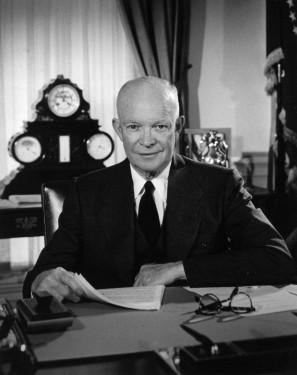It happened today - January 17, 2016
 On Jan. 17 of 1961 Ike said goodbye to America and, in some sense, America said goodbye to the innocent 1950s and hello to the turbulent 1960s. Eisenhower’s own small contribution was the remarkable warning in his Farewell Address about a “military-industrial complex”.
On Jan. 17 of 1961 Ike said goodbye to America and, in some sense, America said goodbye to the innocent 1950s and hello to the turbulent 1960s. Eisenhower’s own small contribution was the remarkable warning in his Farewell Address about a “military-industrial complex”.
As I mentioned on January 12, it was in some ways odd for this warning to come from a career military man who’d been Supreme Commander of the Allied Expeditionary Force in Europe, that is, the boss of D-Day and on. Surely he’d seen the enormous benefits of mass-mobilized armies backed by mass production.
Indeed he had, both in defeating Hitler and in deterring Stalin. But he was also a classic small-government guy who wished the United States didn’t need a permanent expensive military establishment although he recognized, and said aloud, that it did. And he understood the harmful way in which those who benefit from big government can develop a vested interest in it that distorts politics.
Eventually this insight would be picked up and abused by radicals who would claim that the military-industrial complex actually went around creating, or even inventing, enemies to justify lucrative defence contracts. Alas, the world is a sufficiently dangerous place that there was no need to do so. And, I might add, the Western system of limited self-government is sufficiently robust that such conspiracies cannot flourish.
Interestingly, the radical critique came not only from the left. There is also a branch of the libertarian movement that condemns the “welfare-warfare state” in which moderate right and moderate left are united in supporting big government because the left likes the social programs and the right likes the defence programs. Personally I’m a libertarian in a lot of policy issues, though a conservative metaphysically, and one reason why is that libertarianism is generally way off base on national security. But let’s come back to the welfare bit.
I’m not sure the 1950s was really all that innocent; the baby boom surely indicates that they’d heard of sex. Nor am I sure that we’re as sophisticated as we think. Including in our naïve trust of huge government.
If Eisenhower was wrong, or at least exaggerating, about the dangers of the warfare state, his point about incentives distorting public policy surely applies to the vast apparatus of the modern welfare state. In his day defence took more than half the U.S. budget; now of course it is far smaller, and being perilously squeezed, by runaway social programs.
These have a vast constituency, not just in the obvious bureaucracy but among the tens of millions of Americans now dependent on the state, including a vast number of single mothers almost literally married to it. And in public education, where it is surely not coincidence that the dominant ideology among those dependent for a living on government funding is that government should be huge and within its vast bulk education should be securely contained.
If you try to cut social programs now, from welfare to pensions to education to health, you run into bitter, massive opposition. And it comes not just from those convinced it’s a mistake in principle but especially from those who have a huge personal stake in it and will resort to almost any argument, however disingenuous, to keep the cash flowing.
Eisenhower didn’t warn of this development because as late as 1961 social programs were still quite small and people still believed that they were highly dangerous.
One of his 20th-century predecessors had said while campaigning “I am opposed to any form of dole. I do not believe that the state has any right merely to hand out money.” And in office that president had said “The lessons of history, confirmed by the evidence immediately before me, show conclusively that continued dependence upon relief induces a spiritual and moral disintegration fundamentally destructive to the national fiber. To dole out relief in this way is to administer a narcotic, a subtle destroyer of the human spirit.” And it wasn’t Herbert Hoover; it was Franklin Roosevelt. So it didn’t seem that likely that within a decade of Ike’s departure from office the nation would be facing a welfare-bureaucratic complex producing high taxes, huge deficits and multigenerational dependency whose distorting effects were clearly visible in the 2012 presidential election. But it did.
It’s too bad people didn’t listen more carefully to Eisenhower, to understand that behind the specifics of his warning so polemically useful to the New Left there was a much deeper insight about the unhealthy way in which a large government can create unwholesome distortions in the political process.
On the plus side, at least after eight years in the White House Eisenhower had something sufficiently memorable to say on the way out that we’re still talking about it. Many presidents are barely able to capture our attention even while holding office.